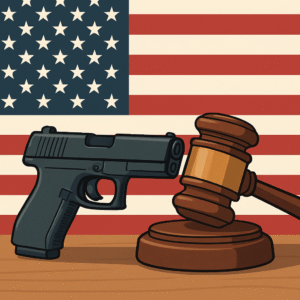
🏛️ Introduction
In 2025, handgun laws in the United States remain a complex and evolving patchwork of federal, state, and even local regulations. While the Second Amendment provides a constitutional right to keep and bear arms, how that right is interpreted and applied varies significantly across jurisdictions. From permitless carry laws to concealed handgun licensing, every American citizen must navigate both broad national protections and highly specific local limitations.
This mosaic of legal coverage means individuals must understand both national and regional policies to fully understand their handgun rights.
Last Updated: June 23, 2025
Author: Nahyan | UsLawGuide.net
🔬 Federal Handgun Laws (2025)
Under federal law, key requirements remain consistent nationwide:
- Minimum Age: 21 to purchase a handgun from a licensed dealer.
- Background Checks: Required under the Brady Handgun Violence Prevention Act.
- Prohibited Persons: Includes felons, domestic abusers, and certain mentally ill individuals.
- Gun-Free Zones: Firearms are still prohibited in certain federal buildings, schools, and courthouses.
Although the core framework hasn’t changed significantly since the Bipartisan Safer Communities Act (2022), enforcement guidance has evolved, particularly in how states report mental health-related disqualifiers.
🌍 State-Level Handgun Laws: A Patchwork System
Each state has the power to expand, restrict, or otherwise customize how handgun laws apply. As a result, gun owners must be aware of variations, especially when traveling.
Concealed Carry Permits (CCW)
- Shall-Issue States: Most states, like Texas and Florida, issue permits if eligibility criteria are met.
- May-Issue States: California, Maryland, and a few others still exercise some discretion.
- Permitless Carry: As of mid-2025, 29 states allow eligible adults to carry concealed handguns without a permit (also called “constitutional carry”). South Carolina and Louisiana are the latest to join, with their laws taking effect in early 2025.
Open Carry
- Legal without a permit in about 31 states, but some require a license (e.g., Oklahoma, Iowa).
- Highly restricted or prohibited in California, Illinois, New York, and others.
Waiting Periods
- Mandatory waiting periods exist in California, New Jersey, and a few other states (typically 7 to 10 days).
Registration Requirements
- Mandatory handgun registration exists in Hawaii, Washington, D.C., and parts of New York. Most states do not have centralized handgun registries.
Red Flag Laws
- Enacted in 21 states and Washington, D.C., these laws allow temporary removal of firearms from individuals deemed a threat by courts.
✅ Key Legal Developments in 2025
🔒 SCOTUS Upholds Ghost Gun Regulation (Bondi v. VanDerStok)
In March 2025, the Supreme Court upheld the ATF’s authority to regulate “ghost “guns”—unfinished firearms and kits lacking serial numbers. This landmark case reinforced the government’s power to require serialization and background checks on these items.
🌐 Expanded Reciprocity Agreements
More states have signed reciprocity agreements, making it easier for gun owners to carry across state lines using valid concealed carry licenses from their home state. Texas, Louisiana, and Georgia were among the most recent states to expand such partnerships.
✅ Fee Reductions for CCW Permits
Several states have reduced or eliminated concealed carry permit application fees to increase access and reduce bureaucratic barriers.
❓ FAQ: U.S. Handgun Laws
Can I carry my handgun into another state?
Only if that state honors your concealed carry permit or allows permitless carry. Always check reciprocity laws before traveling.
Are background checks required for private sales?
Only in states with universal background check laws (e.g., Colorado, New York). Federal law does not mandate checks for private party sales.
What counts as a “ghost gun”?
Any untraceable firearm without a serial number, typically assembled from a kit. These now require background checks under the 2025 SCOTUS ruling.
Do I need a license to own a handgun?
Most states do not require a license to own a handgun, but several require a license to carry one.
🌐 Internal Links
⚠️ Legal Disclaimer
This article is for informational purposes only and does not constitute legal advice. Always consult an attorney or your local law enforcement agency regarding your state’s specific handgun laws.